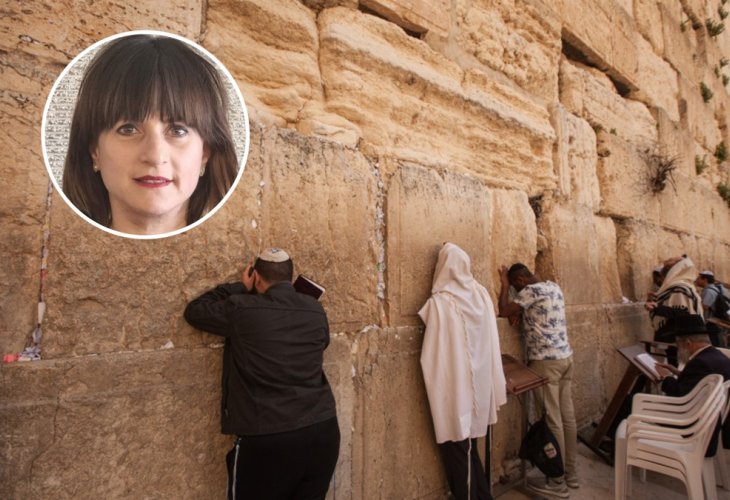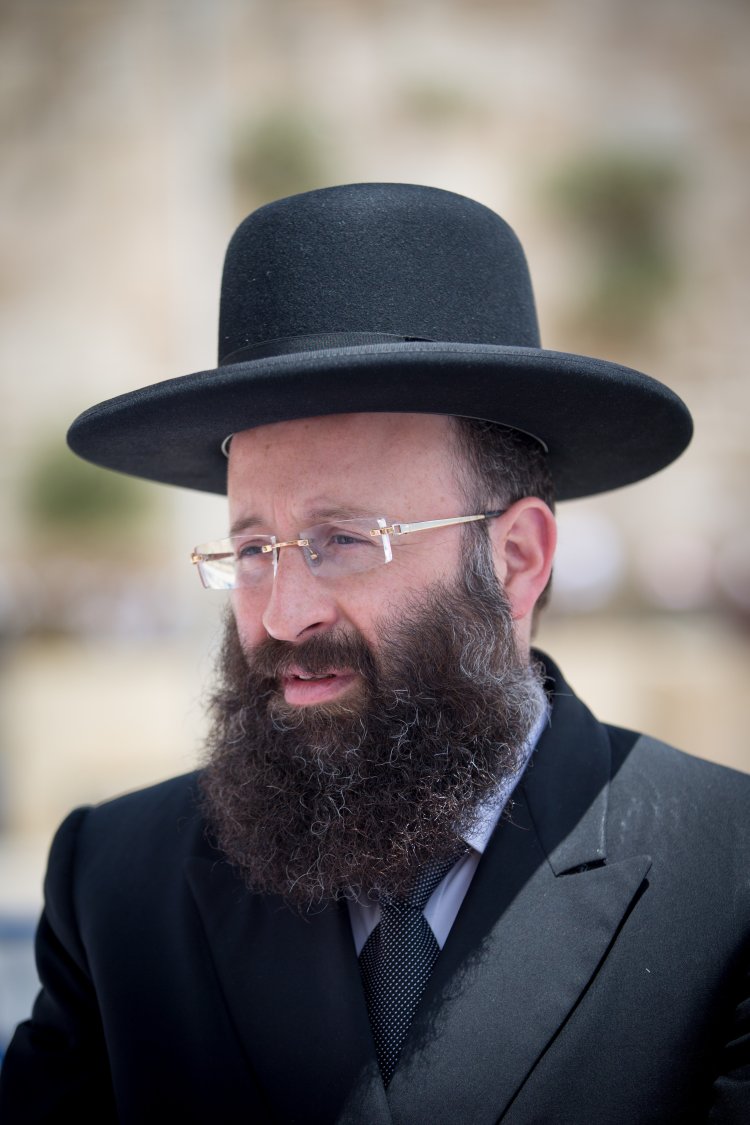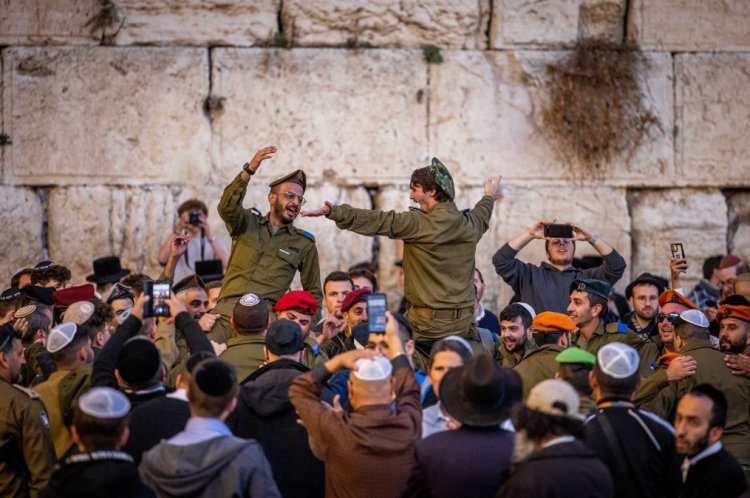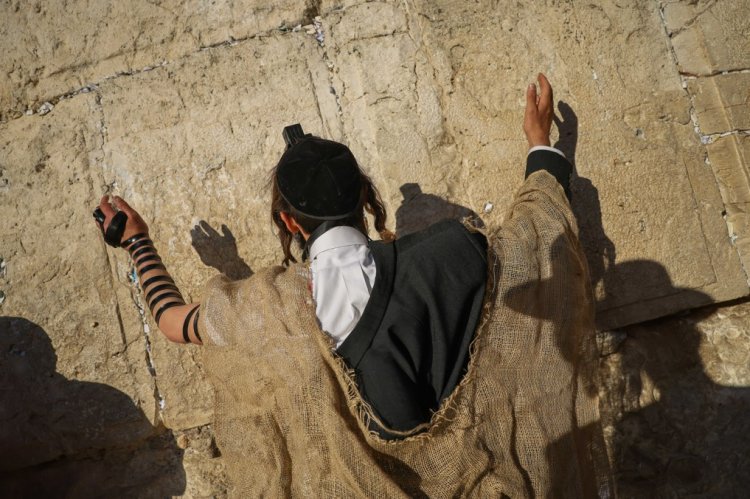Personal Stories
The Woman Behind the Western Wall: Yael Rabinowitz on Faith, Unity, and the Sacred Mission of Guarding Holiness
Rare insights into life beside Judaism’s holiest site — the challenges, miracles, and powerful moments of faith that unite millions of visitors in prayer and hope for the rebuilding of the Temple
 Yael Rabinowitz (Background: shutterstock)
Yael Rabinowitz (Background: shutterstock)About twenty-five years ago, when Mrs. Yael Rabinowitz and her husband, Rabbi Shmuel Rabinowitz, were a young couple, the rabbi was appointed to the defining role of his life — Rabbi of the Western Wall. From that moment, the couple entered a world unlike any other — a world filled with holiness and prayer, but also challenges, tensions, and sensitive issues that test that very holiness every day.
“At first, we didn’t realize how complex and demanding the position really was,” recalls Mrs. Rabinowitz in our conversation. “We always felt the awe and the responsibility,” she says, “but as the years go by, we understand just how deep this mission is. It’s a calling of the highest order — one that grows more challenging yet also more rewarding every year. Personally, I feel that since the Wall is such a sacred place, it naturally attracts powerful forces that try to disrupt its holiness. Our role is to ensure that holiness triumphs — to guard the sanctity and honor of the Kotel.”
 Rabbi Shmuel Rabinowitz (Photo: Yonatan Sindel / Flash 90)
Rabbi Shmuel Rabinowitz (Photo: Yonatan Sindel / Flash 90)“The Western Wall Belongs to Everyone”
Rabbi Shmuel and Yael Rabinowitz have been married for over thirty years. They are parents to eight children and have lived in Jerusalem throughout, devoting their lives to serving the Kotel and the people who visit it.
What exactly is the role of the Rabbi of the Western Wall?
“The role is incredibly broad,” explains Mrs. Rabinowitz. “He represents both the State of Israel’s official policy at the site and the rulings of the Chief Rabbinate concerning it. He’s responsible for organizing state ceremonies at the Wall, as well as family celebrations like bar mitzvahs. He welcomes world leaders and diplomats, while ensuring that every private visitor feels at home — because the Kotel belongs to everyone.
“It’s not always simple. My husband often faces extremely delicate crossroads — political, social, and religious. But the purpose of the role is clear: to bring Jews closer to their Father in Heaven. I can testify that he does everything in his power to make the Kotel an open spiritual home for every Jew. The results speak for themselves — each year, more and more groups visit the Wall: schoolchildren, soldiers, Birthright groups, Holocaust survivors celebrating their first bar mitzvah, and many more. Just a decade ago, about two million people visited annually. Today, that number is closer to fourteen million.”
 Photo: Yonatan Sindel / Flash 90
Photo: Yonatan Sindel / Flash 90Balancing Sanctity and Sensitivity
Throughout the year, complex issues arise at the Kotel, including political tensions, religious disagreements, and even security challenges. “All of these end up on my husband’s desk,” says Mrs. Rabinowitz. “He must navigate them with sensitivity, maintaining balance and unity. I also play a small part — attending many official events with dignitaries and visiting first ladies, representing the spiritual beauty of the women’s section of the Kotel.”
She smiles: “There’s no doubt the role consumes much of his time and demands many sacrifices. We miss family events, we skip vacations, but the sense of mission outweighs it all. It’s an honor to serve the people of Israel this way.”
The Power of Prayer and Unity
Mrs. Rabinowitz visits the Kotel every Friday night for Kabbalat Shabbat and once more during the week.
“People sometimes ask if being so close to the Wall makes it feel less special,” she says. “Absolutely not. Every visit fills me with awe anew. On Friday nights, when thousands gather for the Shabbat prayers — Ashkenazim, Sephardim, men in black hats and knitted kippot, young and old — it’s a breathtaking sight. Hundreds sing and sway together in joy and holiness. That unity, that harmony of voices and hearts, could only happen here — in Jerusalem, at the Wall.”
Yom Kippur, she adds, is another deeply moving time: “We spend the entire day at the Kotel, praying just meters away from where the High Priest once stood in the Holy Temple. To feel that closeness, to be emissaries of the Jewish people in that space — it shakes the soul.”
 Photo: Nati Shochat / Flash 90
Photo: Nati Shochat / Flash 90Hosting Ivanka Trump and the Daughters of Israel
Over the years, the Rabinowitz family has hosted countless world leaders — including U.S. President Donald Trump. “But the most emotional visit for me,” Yael recalls, “was hosting his daughter Ivanka, who converted to Judaism. Watching her stand before the stones of the Wall, tears streaming down her face — it was incredibly moving.
“And yet,” she continues, “what touches me most isn’t the famous guests, but the thousands of ordinary women who come to pray — mothers, daughters, grandmothers — pouring out their hearts, whispering prayers of pain and gratitude. When I stand beside them, I feel my own prayers rising with theirs. The Kotel connects heaven and earth.”
Between the Walls and the Heart
As the Three Weeks and Tisha B’Av approach, Mrs. Rabinowitz reflects deeply: “These are days of mourning for the destruction of the Temple — caused, as we know, by baseless hatred. It’s no coincidence that so many come to the Kotel during this time, weeping over the exile of the Divine Presence.
“I find myself focusing on the words of the prayer Aleinu Leshabeach: ‘To see soon the glory of Your strength… to remove idols from the earth, to perfect the world under the reign of God.’ That’s exactly what we pray for now — for a world of peace and holiness.”
On Tisha B’Av, she and her husband spend the morning at Rachel’s Tomb. “We read Eicha and cry with Rachel as she weeps for her children. Later that day, we return to the Kotel for Mincha — the afternoon prayer — believing, as our sages said, that Mashiach will be born on Tisha B’Av itself.”
 Photo: Haim Goldberg / Flash 90
Photo: Haim Goldberg / Flash 90“Listen, and There Will Be Space for All”
This year, Mrs. Rabinowitz leaves the public with a heartfelt message: “Now more than ever, the cure for baseless hatred is boundless love. My husband always quotes the Midrash: In Jerusalem, during the pilgrimages, the people stood crowded together but bowed with space between them. How? Because when a person stands stubbornly on his own opinion, even a palace feels cramped. But when he bows his head and listens to another, even a small room feels spacious.
“This year,” she concludes, “let us learn to listen. If we truly hear one another, there will be room for everyone — and, God willing, we will merit the rebuilding of our holy Temple.”

